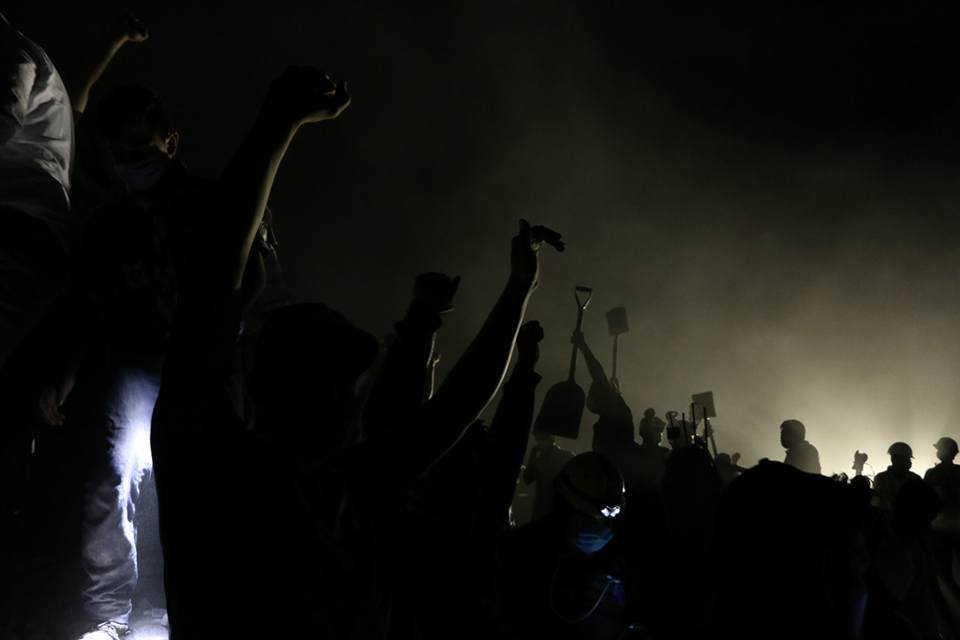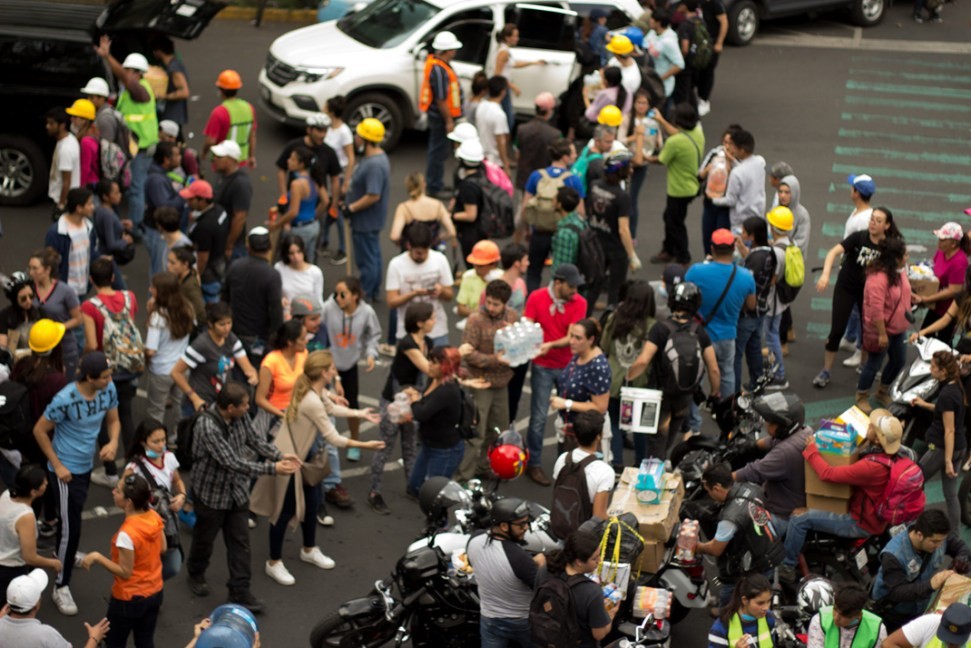Filed under: Analysis, Disaster, Southern Mexico

In exceptional times, phenomena that are normally considered marginal become essential and delineate the common of an epoch. We are living in one of those times.
— Insurrectionary Fragments, Marcello Tari
It is enough just to close our eyes for the images and sounds that still burn in our heart to immediately be remembered. Memories that assault the present, like aftershocks of one of the worst tragedies we have experienced in our lives: collapsed buildings, clouds of dust, faces stricken with anguish, the creaking of shaken city, pleas of desperation and help escaping from under the rubble, the sad song of the ambulances.
As soon as the earthquake was over, time itself seemed to have stopped or slowed down. Seconds fell upon each other, inexorable, like heavy slabs that buried us as our gaze joined with others, slowly discovering the magnitude of the tragedy.
It is curious, this quality that time has to speed up or to come to a halt; to suspend itself in the most violent way and rupture continuity, fracturing itself open, opening cracks, escape routes that allow us to understand reality and space in ways different from those we have become accustomed to.
Somehow, this break in time and order has caused a sudden collapse in the minutes, hours and days following the catastrophe; an accumulated catastrophe that spread with the most recent disaster, but which we’ve lived through in these territories since before the earthquakes on September 7 and 19. Tragedy in the form of femicides, of thousands and thousands killed, of the desperation of mothers who for years have searched, alone, for their disappeared children, of the precarity of work and housing that we experience, of the (in)human and (anti)social relationships we face everyday.
In this moment in which democracy has truly become an empty signifier and in which more and more people see that is impossible to cover up the great cracks it produces, solidarity and mutual aid reappear in the metropolis shaken so violently by the magnitude of the collapse. There are no representatives, we are thrown in to the streets with our singularities, struggling to rescue something living from between the debris of a collapsed system that is today evident in its crumbling buildings and institutions, held together only by the corruption of the private and public sectors.
Who if Not Us?
We are thousands of people oriented towards the possibility of collective survival, from the highest mountain of rubble to the last hands that form the human chain by which we try to carry away the rubble that is suffocating us. The emergency tells us that this is a struggle against time which, once again, seems to have accelerated.
It is this ability to rebel as forms-of-life against the tragic condition which passes through us that holds us together along each of the planes that enable us to exist as collective potential. This consists of material means such as shovels, buckets and spikes, the common faculty of producing, of procuring, of caring for each other, the sharing of the use of knowledge, the capacity to resist, the intelligence to dismantle the social structure that has long since collapsed. A structure that day by day, and without much mystery, seeks to diminish this potential until it is made compatible with the many varied levels of devastation and alienation, past, present, and future.
It is the organized totality of the social that appears immediately as the field of hostility. The democratic regime is constituted by a combination of neutralizing social relations that reproduce “society”: a particular composition that segregates the worst affects. To escape the debris of a system that already collapsed, we have two fundamental tasks. Firstly, to abolish the environment constituted by the apparatus of production and control which enable governance. Secondly, to sabotage all those forms of social relation that incessantly produce and value the beast of capitalist “subjectivity”, which holds existence itself prisoner.
The physical and emotional ability to work together with those who share common objectives, without mediation and in an affective way, is an ability that disarms the “save yourself if you can” mentality that we have told to live by according to the society which we inhabit. It is not unreasonable to be against this selfish society, much less to seek to build with others a plane of subversive consistency worthy of these times.
We do Not Want Them, We Do Not Need Them
This means that the desire to survive is not separate from the intelligence that constructs the possibility of living another way. The cooperation of removing debris, establish collection centers, producing food and preparing shelter, among other things, is the same cooperation that is capable of building communality. To open a huge crack, which can provide the material means and produce the effective relationships that allow it to endure and spread everywhere through practices that, as they are being shared, are breaking the entangled apparatuses that oppose its realization.
It is the task of those who have been affected by this earthquake to realize the re-elaboration of how we organize ourselves from what there is, what we live and feel collectively, proceeding in a transverse direction. A labyrinth without a center that expands anarchically, disaggregated, that passes through the small group, the collective house, the affects, the protests, the tools, the production, in order to occupy, with its violent capacity of communication, the totality of the social organization in order to finally break the automation of its functioning.
An organization of sensibility through which increasingly intense forms of political friendship are developed in an expansive wave that diffuses by resonance — by ripples of intensity. Through the polarization of common experiences in which the intense affects which circulate between comrades are capable of concentrating into an offensive action that at the same time renders new worlds inhabitable. The revolutionary situation, then, can not only better encircle the object of hostility, but also finally transform friendship into a political, ethical and emancipatory concept. In this catastrophic epoch, it is from the ruins and debris that the insurrectionary present is born.







